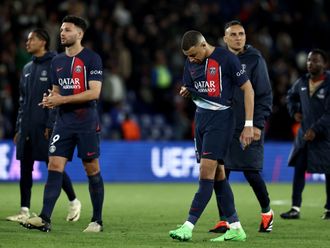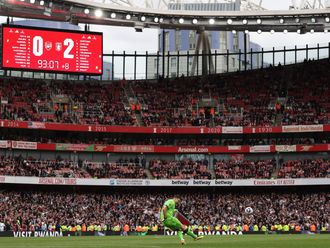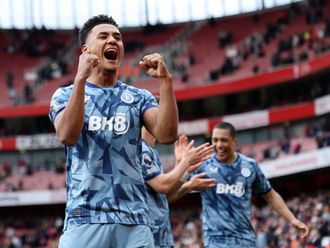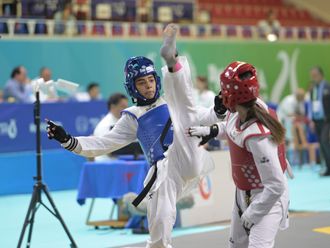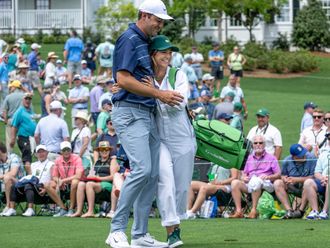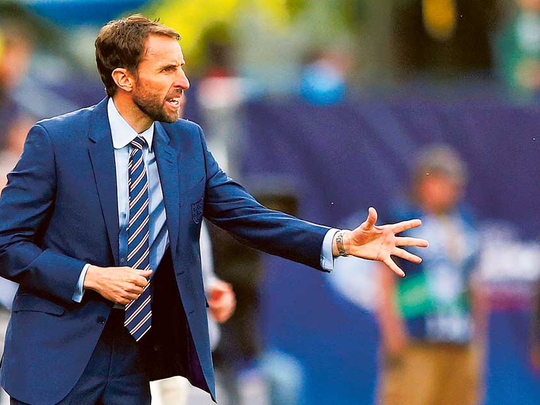
Burton-On-Trent: More than anything, there was the clear impression that the Football Association would, if possible, like to airbrush the Sam Allardyce era out of its history. Walk into St George’s Park and all the branding put in place by the previous manager — “Our Journey Begins Here” — has vanished.
Allardyce, one imagines, will never be added to the wall lined with photographs of England’s managers and, when Gareth Southgate took his seat in the Terry Venables Room, the mind went back a few weeks to the last audience there with his predecessor.
Allardyce was in the Ron Greenwood Room that day. “The names here inspire me,” he said. “I am staying in the Sir Bobby Charlton Suite. Do you think there might be a Sam Allardyce Suite here one day?”
Southgate, true to form, was nothing like as brash or showy as the man who turned up at his first England press conference in a shirt with his initials monogrammed on the cuffs. There was no “bring it on, lads” from Southgate. He wore turn-ups in his suit trousers, his socks were from Next and, to turn around his memorable old quote about Sven-Goran Eriksson, if anyone wanted Churchill what we got was Iain Duncan Smith.
Southgate rolled his eyes when it was put to him that he might be too nice — and that side to him does get overplayed sometimes — but he still came across as a decent fellow with good judgement, clear thinking and old-fashioned values. The kind of guy, in other words, you would quite like to make a decent fist of it. Whether that makes him a suitable England manager is another matter, particularly when it was only September 5, having declined the caretaker role after Roy Hodgson’s departure, that he explained “it wasn’t something I think I’ve got the experience for”.
What, Southgate was asked, had changed? “This situation is different,” he replied. “The circumstances have thrown up a situation where you have to assess quickly who is the right person — and who is going to do it well? I look around at my compatriots and think: ‘Who is the best placed?’ Do I feel that I am the right person, at this moment in time, to do this particular role? Yes,absolutely.”
That still left everything feeling slightly hazy and when Southgate was asked if he wanted the job fulltime, or was even tempted, that was the moment the politician really came out.
Southgate simply would not answer straight-on, talking around the question at least half a dozen times. Maybe he was not entirely sure himself and his four matches, starting against Malta at Wembley on Saturday, will give him the chance to get a better feel for the job. He is under audition and it was intriguing to hear the manager of England’s under-21s — someone, you might assume, who would be inclined to pick younger players for the senior squad — having the courage to say his predecessors might have been straying too far down that route, hence the recall for Glen Johnson.
Wayne Rooney, he said, would not be given the same licence to roam that he had under Allardyce and we in the media can forget the new man in charge announcing his team early.
Allardyce let it out two days before his one match in charge, against Slovakia, but Southgate sees that as self-defeating. “I’m not sure why I would ever give the opposition that information,” he said.
There was one standout soundbite related to Allardyce’s removal — “I’m involved in an industry I love and an industry, at times, I don’t like” — but he quickly clammed up on that one, declining to explain what he meant. “We haven’t got long enough,” he said.
There were enough clues to indicate the 46-year-old was open to the idea of continuing after his seven weeks in charge.
Southgate has an obliging first game — the only other time Malta have visited Wembley, in 1971, ended in a 5-0 England victory — and he shook his head to the question of whether he would be nervous. “I go back to my time at Middlesbrough, standing in the dressing room at the age of 35, with no coaching experience, dealing with the likes of Mark Viduka, Mark Schwarzer and Jonathan Woodgate. I was nowhere near the level I am now — nowhere near. Yet we finished 12th and 13th in the Premier League, and you’d be looking at some high-profile names now finishing in those positions.”
He made a good point, even if he omitted to mention they were subsequently relegated and he was sacked two months into the following season, albeit in fourth place in the Championship.
“If you are in football for a lifetime, and you start somewhere like Crystal Palace, you are building resilience,” he said. “All of those life experiences build you up to a moment where you realise it is time to step in and show your leadership. At some points in my career, I have underestimated what those experiences have given me.
“But I am quite clear on that now. I’m always drawn to the [Theodore] Roosevelt quote: ‘It’s not the critic that counts.’ That, for me, is what it is about. Otherwise I would still be sitting with Keano [Roy Keane] and Dicko [Lee Dixon] on the side. At times, you have to step forward and take a risk. You have to put yourself in that situation.”


